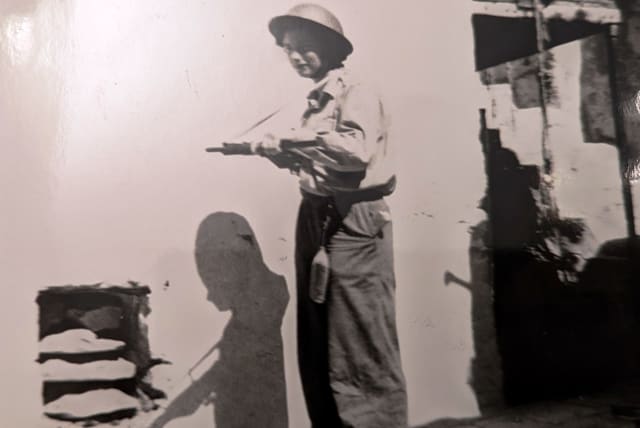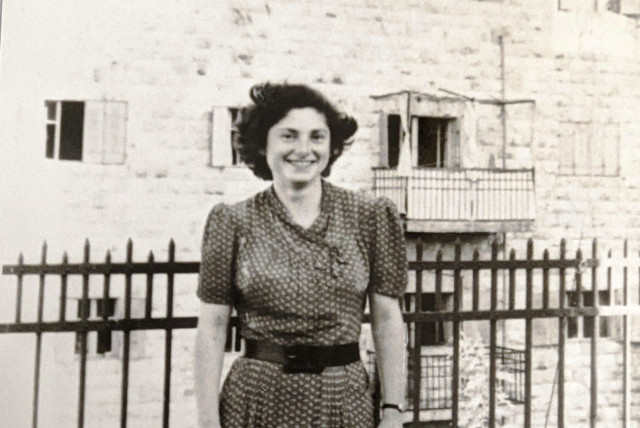Esther Cailingold: The woman of destiny who fought for Israel

Esther Cailingold was one of a small number of women who fought in Israel's War of Independence.
The Merriam-Webster dictionary defines the word “destiny” as a “predetermined course of events often held to be an irresistible power or agency.” Perhaps some people’s destinies are predetermined or shaped by coincidence. But in the case of Esther Cailingold, her destiny was forged by every proactive step she took in life.
I had the privilege of meeting Esther’s 93-year-old brother, Asher, who lives in Jerusalem. Like Esther, he has lived his life on the ethos of service to his people, as a groundbreaking social worker and in his work at the Jewish Agency. Asher is the author of a remarkable biography, An Unlikely Heroine – Esther Cailingold’s Fight for Jerusalem, (Vallentine Mitchell) which interweaves her detailed biography with the story of the nascent state. When we spoke of events that took place 80 years ago, he recalled them as if they occurred yesterday.
Esther, born in London in 1925 to Anne and Moshe, was the oldest of three siblings. Moshe had been among the founders of Young Mizrachi in Poland and had first visited London in 1919 to speak at the opening of the movement there. Upon his return to Warsaw, he witnessed a Polish soldier attacking a Jew and intervened, throwing the soldier to the ground. As the police arrived, Moshe escaped. That night, he crossed the border into Germany, and with his still valid British visa returned to London.
During World War II, the family experienced the intense bombing campaign on London by Nazi Germany. The three Cailingold children were sent to live with a non-Jewish family in Luton. Even at age 14, Esther displayed a sense of responsibility and leadership skills by taking care of siblings Mimi and Asher, making sure to uphold adherence to Shabbat and kashrut laws under very difficult circumstances.
The Cailingolds were one of the few Religious-Zionist families in London at the time. In addition to her upbringing and participation in the Bnei Akiva youth movement, Esther’s sensitivities to the importance of a Jewish homeland were heightened by the loss of many family members in the Holocaust and by the antisemitism and anti-Zionism of the British. For all these reasons, Esther was determined to make her way to Palestine and serve the cause of the establishment of a Jewish state.
By 1946, having won a scholarship to the University of London, she had completed a BA in two years, with first-class honors in English. Asher recalls that one Shabbat, while reading The Jewish Chronicle, Esther jumped up and shouted, “I found it!” She had noticed an advert posted by the Evelina de Rothschild School in Jerusalem for an English teacher. Realizing that this was a way to obtain a visa at a time when the entry of Jews to Palestine was almost impossible, she seized the opportunity. Her application was accepted. Within a few weeks, Mimi and Asher stood outside their home, watching their 21-year-old sister climbing into a taxi, “her whole life ahead of her.”
Esther’s joy at reaching her destination is captured in her letters home, which describe the sights, sounds, scents and atmosphere of Jerusalem in enthused, idealized terms. She took her work seriously but had time to pursue her passions, which included attending orchestral concerts by the Palestinian Symphony Orchestra.
But as the months passed, the British became increasingly hostile toward the Jews, and Arab hostilities were on the rise. In January 1948, she resigned from her teaching post and volunteered for the Hagana.
Like all the women volunteers, her tasks involved support for the men in combat. Although she was assigned to cooking duties, Esther was driven to be a fighter herself and insisted on receiving combat training. She became a radio broadcaster, worked in intelligence and as a welfare officer for wounded soldiers. This meant that she rushed from duty to duty through a city that has become increasingly more dangerous and cut off in sections, since the British create closed areas, surrounding them with barbed wire and manned checkpoints.
ESTHER BELIEVED that she could best serve by defending the ancient Old City of Jerusalem, the place that had been but a mythical aspiration in the minds of Jews for almost two millennia. There were just 1,700, mostly women, children and elderly, remaining in the Jewish Quarter. A tiny group of fighters, hopelessly under-armed and under-supplied, were defending it against the might of the Jordanian Legion and “irregular” local mobs. Yet the British would not allow additional Jewish fighters to enter the ancient walls.
However, ironically, they were looking for teachers to supervise the many uncared-for children in the quarter, so Esther applied and received an entry permit. Time after time she reported to the British convoy assembly point, only to find out that her name was not included on the list for that day. Finally, at the beginning of May, she was allotted a spot on the last convoy to enter the Old City.
Asher remembers the day in London when a young man approached him and introduced himself as Gubby Haffner. He had met Esther in Jerusalem and they had become friends. He had seen her just before she entered the Old City and she had asked Gubby to send regards to her family. Gubby and Asher became best of friends, and Gubby later married Asher’s sister Mimi. Subsequently, Gubby changed his name to Yehuda Avner. He had an outstanding career in diplomacy, and as an adviser to four prime ministers, authored the bestselling book The Prime Ministers.
Upon entering the Old City, Esther reported to commander Moshe Rousnak. Despite his inexperience and the dire situation, Rousnak led his motley force of 140 men, women and teenagers admirably. Esther was appointed liaison for the western fortification. Each time she set out along the rooftops, she risked her life. Adina Argaman remembers that “she had a special kind of tranquility, dodging the shells and bullets with no sign of fear.”
The declaration of independence on May 14, 1948, was marked in the Old City by a small flag-raising ceremony. On May 16, Arab forces commenced an attack on the Jewish positions, signaling the beginning of possibly the longest single battle in the history of the state. That day, Esther was shot and moderately wounded. She tied her wound with a handkerchief and crawled to safety. Making her way alone to the Misgav Ladach Hospital, she was treated. Defying orders to rest, she immediately returned to her post.
The situation was utterly without hope, yet the fighting raged on. On May 26, Esther ran toward a suspicious building. As she reached the door, there was a huge explosion and she was severely wounded, her injuries including a shattered spine. Fighters carried her on the torn-off door to the hospital, which was devoid of any of the equipment and supplies necessary to treat her.
On Friday, May 28, despairing of the promised assistance that never arrived, and in order to prevent a massacre, the troop finally surrendered. That evening Esther, who was suffering immense pain, asked for a siddur in order to recite the evening prayers. All of the wounded were moved to the Armenian school under extremely difficult conditions, such as having to lift the stretchers over high walls. No painkillers remained, so Esther was offered a cigarette. “No,” she mumbled, “it is Shabbat.”
ESTHER CAILINGOLD, one of a small number of women who fought in the War of Independence, died the next morning, aged 22 years and 11 months. In her last letter back home, she wrote: “I have no regrets… it has been worthwhile because I am quite convinced that the end will see a Jewish state and the realization of our longings. I have lived my life fully, if briefly, and I think this is the best way – ‘short and sweet.’ Very sweet it has been here in our own land.”
Rousnak later wrote, “Her determination was an example and a source of strength to the other fighters who were with her. When most of the Jewish Quarter was already in enemy hands, Esther and a number of other young fighters fought fiercely and valiantly… Her death was a serious blow to all those who knew her and admired her bravery and her gallant stand as a fighter who knew no fear.”
The aforesaid definition of “destiny” continues, “(It) often suggests a great or noble course or end.” Esther Cailingold, and all of the men and women who have fallen in the realization and safeguarding of our country, are the personifications of that noble end. Seventy-five years on, their destiny is a gift to us and our inspiration.
The writer thanks Asher Cailingold for his kind assistance. His book is available on Amazon.
Esther Cailingold’s last letter:
May 23, 1948
Dear mummy and daddy, and everybody,
If you get this at all, it will be, I suppose, typical of all my hurried, messy letters. I am writing it to beg of you that whatever may have happened to me, you will make the effort to take it in the spirit that I want and to understand that for myself, I have no regrets. We have had a bitter fight: I have tasted of gehenom [hell] – but it has been worthwhile because I am quite convinced that the end will see a Jewish state and the realization of our longings.
I shall be only one of many who fell in sacrifice, and I was urged to write this because one in particular was killed today who meant a great deal to me. Because of the sorrow I felt, I want you to take it otherwise – to remember that we were soldiers and had the greatest and noblest cause to fight for. God is with us, I know, in His Holy City, and I am proud and ready to pay the price it may cost us to reprieve it.
Don’t think I have taken “unnecessary risks.” That does not pay when manpower is short. I hope you may have a chance of meeting any of my co-fighters who survive if I do not, and that you will be pleased and not sad of how they talk of me.
Please, please, do not be sadder than you can help. I have lived my life fully, if briefly, and I think this is the best way – “short and sweet.” Very sweet it has been here in our own land. I hope you shall enjoy from Mimi and Asher the satisfaction you missed in me. Let it be without regrets, and then I too shall be happy.
I am thinking of you all, every single one of you in the family, and am full of pleasure at the thought that you will, one day, very soon I hope, come and enjoy the fruits of that for which we are fighting.
Much, much love, be happy and remember me in happiness.
Shalom and lehitraot,
Your loving Esther
Jerusalem Post Store
`; document.getElementById("linkPremium").innerHTML = cont; var divWithLink = document.getElementById("premium-link"); if (divWithLink !== null && divWithLink !== 'undefined') { divWithLink.style.border = "solid 1px #cb0f3e"; divWithLink.style.textAlign = "center"; divWithLink.style.marginBottom = "15px"; divWithLink.style.marginTop = "15px"; divWithLink.style.width = "100%"; divWithLink.style.backgroundColor = "#122952"; divWithLink.style.color = "#ffffff"; divWithLink.style.lineHeight = "1.5"; } } (function (v, i) { });

